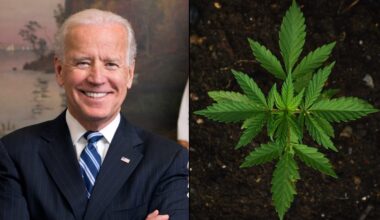The Pennsylvania Senate on Wednesday approved a bill to safeguard banks and insurers against being penalized by state regulators for working with state-legal medical marijuana businesses.
The bipartisan legislation from Sens. John DiSanto (R) and Sharif Street (D) moved through two committees in recent days before being taken up on the floor and passing in a 46-3 vote. It now heads to the House.
This effort is yet another example of how states are working to provide financial protections to institutions that are willing to service the cannabis market as Congress continues to stall on a federal fix.
“Federal prohibition has forced the cannabis industry to deal with cash, as proceeds may be considered a federal crime,” DiSanto said on the floor on Wednesday, adding that the cash-intensive nature of the existing marketplace “makes dispensaries a target for armed robbery.”
“Improved access to financial services will reduce this public safety risk,” he said. “Banking this cash in Pennsylvania will grow our economy and lower costs for medical patients.”
The Pennsylvania bill would not immunize banks and insurers from potential federal repercussions—but it’s an interim step meant to signal to the financial sector that they at least won’t face penalties under state law.
DiSanto and Street previously circulated a co-sponsorship memo to colleagues ahead of the banking bill’s introduction that addressed the public safety problems posed to marijuana businesses without access to traditional financial services, forcing many to operate with large volumes of cash that make them targets of crime.
—
Marijuana Moment is already tracking more than 1,000 cannabis, psychedelics and drug policy bills in state legislatures and Congress this year. Patreon supporters pledging at least $25/month get access to our interactive maps, charts and hearing calendar so they don’t miss any developments.![]()
Learn more about our marijuana bill tracker and become a supporter on Patreon to get access.
—
Street said on the floor on Wednesday that the legislation will “take the first step” toward reform by “allowing and making it more feasible for people in the cannabis business to move away from being a cash business [and] to use our banking system.”
The move to provide state-level protections could add pressure on congressional lawmakers to enact a federal change, such as the bipartisan Secure and Fair Enforcement (SAFE) Banking Act that has passed the House in some form six times at this point, only to stall in the Senate.
One possible vehicle for that congressional policy change could be a large-scale manufacturing and innovation bill, where marijuana banking was included by the House and may now be taken up by appointed negotiators in both chambers as they head to conference.
The text of the Pennsylvania legislation states that a “financial institution authorized to engage in business in this Commonwealth may provide financial services to or for the benefit of a legitimate cannabis-related business and the business associates of a legitimate cannabis-related business.” The same protections would also be codified for insurers.
However, it specifies that the bill would not require banks or insurers to provide services to medical marijuana businesses.
The legislation says that state government agencies cannot “prohibit, penalize or otherwise discourage a financial institution or insurer from providing financial or insurance services to a legitimate cannabis-related business or the business associates of a legitimate cannabis-related business.”
It also says agencies cannot “recommend, incentivize or encourage a financial institution or insurer” to not provide services just because a business is associated with marijuana.
Further, state agencies could “not take adverse or corrective supervisory action on a loan made to a legitimate cannabis-related business,” the text says.
These are the types of policies that advocates and stakeholders have been pushing Congress to enact at the federal level, but it remains to be seen when that might happen.
Rodney Hood, a board member and former chairman of the National Credit Union Administration (NCUA), has repeatedly emphasized the urgent need for a federal resolution to the marijuana banking problem. He recently applauded efforts by lawmakers in states like Pennsylvania to address the issue within their jurisdictions, but he said it’s not enough.
The federal financial regulator also noted that New York lawmakers are seeking to provide tax breaks for the forthcoming marijuana market, sending a budget proposal to the governor over the weekend that would do just that.
A New York senator is also seeking to give banks in the state a little peace of mind about working with legal marijuana businesses, filing a bill on Tuesday that would allow regulators to disclose certain information about cannabis licensees to financial institutions.
Washington State Treasurer Mike Pellicciotti (D) has also been especially vocal about the need for congressional reform, and he wrote in a recent letter to his colleagues in other states that it’s “just not safe to have this financial volume in cash.”
Pellicciotti made similar remarks at a recent conference of the National Association of State Treasurers (NAST). And Colorado Treasurer Dave Young echoed that sentiment in a recent interview with Marijuana Moment.
The sponsor of the congressional SAFE Banking Act, Rep. Ed Perlmutter (D-CO), told Marijuana Moment on Monday that he’s hopeful that his reform legislation will be attached to the final America COMPETES Act that’s heading to conference.
The congressman pointed out that “more than two-thirds of the conferees [for the large-scale bill] have already voted for or cosponsored the SAFE Banking Act.”
One of those conferees, longstanding marijuana reform champion Rep. Earl Blumenauer (D-OR), said in an op-ed for Marijuana Moment this week that the banking reform measure as “a huge step” toward public safety and equity in the industry.
Perlmutter also recently spoke with Treasury Secretary Janet Yellen about the marijuana banking issue during a hearing of the House Financial Services Committee. And the secretary said that it’s “extremely frustrating” that Congress hasn’t “been able to resolve it.”
The sponsor has even made a point to talk about enacting the reform legislation during committee hearings on ostensibly unrelated or wider-ranging legislation, like at a recent House Rules Committee hearing.
At a recent event hosted by the American Bankers Association (ABA), the congressman said that he will “continue to be a real pest, and persistent in getting this done” before he retires from Congress at the end of the session.
Despite recently saying that he’s “confident” that the Senate will take up his bill this session, Perlmutter recognized that while he’s supportive of revisions related to criminal justice reform, taxation, research and other issues, he knows that “as we expand this thing, then we start losing votes, particularly Republican votes and we got enough votes in the Senate to do it” as is.
Ahead of last month’s ABA event, the financial group released a poll that it commissioned showing that a strong majority of Americans support freeing up banks to work with marijuana businesses without facing federal penalties.
Meanwhile, the number of banks that report working with marijuana businesses ticked up again near the end of 2021, according to recently released federal data.
It’s not clear if the increase is related to congressional moves to pass a bipartisan cannabis banking reform bill, but the figures from the Financial Crimes Enforcement Network (FinCEN) signal that financial institutions continue to feel more comfortable servicing businesses in state-legal markets.
Some Republicans are scratching their heads about how Democrats have so far failed to pass the modest banking reform with majorities in both chambers and control of the White House, too. For example, Rep. Rand Paul (R-KY) criticized his Democratic colleagues over the issue in December.
Meanwhile in Pennsylvania, another Republican senator recently announced that he will soon be introducing a bill to allow medical marijuana patients in the state to buy cannabis edibles at dispensaries.
Sen. Dan Laughlin (R), who has also sponsored legislation to legalize marijuana for adult use and allow patients to cultivate cannabis for personal use, said that patients “should be able to buy edible medical cannabis that is safe, uniform and securely packaged and labeled, just as they do in 25 other states that have legalized medical cannabis.”
Separately, the Senate Law and Justice Committee held the last of three scheduled hearings on marijuana legalization last month, taking testimony that’s designed to help inform a forthcoming reform bill that the panel’s chairman is actively drafting.
Sen. Mike Regan (R), who chairs the panel, circulated a cosponsorship memo last year along with Rep. Amen Brown (D) to build support for the reform, and these meetings are designed to give lawmakers added context into the best approach to legalization for the state.
While reform bills have been introduced in past sessions and the policy change has the support of Gov. Tom Wolf (D), the series of hearings marked the first times a legislative panel had debated recreational legalization in the Republican-controlled Pennsylvania General Assembly.
Pennsylvania lawmakers could also take up more modest marijuana reform proposals like a bill filed late last year to expand the number of medical marijuana cultivators in the state, prioritizing small farms to break up what she characterized as a monopoly or large corporations that’s created supply problems.
Additionally, another pair of state lawmakers—Reps. Jake Wheatley (D) and Dan Frankel (D)—formally unveiled a legalization bill they’re proposing last year.
Philadelphia voters also approved a referendum on marijuana legalization in November that adds a section to the city charter saying that “the citizens of Philadelphia call upon the Pennsylvania General Assembly and the Governor to pass legislation that will decriminalize, regulate, and tax the use, and sale to adults aged 21 years or older, of cannabis for non-medical purposes.”
Wolf, the governor, said last year that marijuana legalization was a priority as he negotiated the annual budget with lawmakers. However, his formal spending request didn’t contain legislative language to actually accomplish the cannabis policy change.
The governor, who signed a medical cannabis expansion bill in June, has repeatedly called for legalization and pressured the Republican-controlled legislature to pursue the reform since coming out in favor of the policy in 2019. Shortly after he did that, a lawmaker filed a separate bill to legalize marijuana through a state-run model.
Meanwhile, Lt. Gov. John Fetterman (D), who is running for U.S. Senate this year, said one of his key goals in his final year in office is to ensure that as many eligible people as possible submit applications to have the courts remove their cannabis records and restore opportunities to things like housing, student financial aid and employment through an expedited petition program.
A survey from Franklin & Marshall College released last year found that 60 percent of Pennsylvania voters back adult-use legalization. That’s the highest level of support for the issue since the firm started polling people about it in 2006.
An attempt to provide protections for Pennsylvania medical marijuana patients from being charged with driving under the influence was derailed in the legislature last year, apparently due to pushback by the state police association.
Also, a bill meant to promote research into the therapeutic potential of psilocybin mushrooms for certain mental health conditions may be in jeopardy, with the sponsor saying recently that the chair of a key House committee is expressing reservations even after the legislation was amended in an effort to build support.
Medical Disclaimer:
The information provided in these blog posts is intended for general informational and educational purposes only. It is not a substitute for professional medical advice, diagnosis, or treatment. Always seek the advice of your physician or other qualified healthcare provider with any questions you may have regarding a medical condition. The use of any information provided in these blog posts is solely at your own risk. The authors and the website do not recommend or endorse any specific products, treatments, or procedures mentioned. Reliance on any information in these blog posts is solely at your own discretion.







